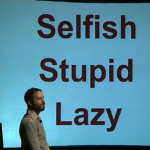 In pondering the whole “Call to Action” and my thoughts yesterday on “Poking the Church” it had me wondering. Why don’t more people get involved and take on their communities and their faith.. What is the one thing? Are we all just to lazy? or maybe we claim to be to ‘busy?’
In pondering the whole “Call to Action” and my thoughts yesterday on “Poking the Church” it had me wondering. Why don’t more people get involved and take on their communities and their faith.. What is the one thing? Are we all just to lazy? or maybe we claim to be to ‘busy?’
Maybe, as Dave Meslin puts in this short talk, its more a web of things that compound. He’s talking up a civic cultural apathy. But this in many ways translates into our church cultures. Especially found his framework of intentional exclusion very insightful.

In community organizing, we know what apathy means. Apathy means that people have given up trying to care, often because of the kinds of brick walls Meslin describes.
But we also know that’s not the end game. People DO care. What they need is an offer and a path to accomplish what they care about instead or more roadblocks to accomplishing it.
I think there are also implications for the church in the “heroes” vision of leadership Meslin names and critiques. Our whole process of “top leadership development” (if you will) is based on the idea that “pastors” are “called” into “the ministry.” We pay lipservice to the calling of all Christians, to be sure, But we still say that “pastors” (and maybe missionaries– we’re still not quite sure about deacons and persons in “extension” ministries– the very term “extension’ sort of betrays that!) are those who have heard and responded to THE call to THE ministry.
Thanks for tagging this provocative and useful video!
In community organizing, we know what apathy means. Apathy means that people have given up trying to care, often because of the kinds of brick walls Meslin describes.
But we also know that’s not the end game. People DO care. What they need is an offer and a path to accomplish what they care about instead or more roadblocks to accomplishing it.
I think there are also implications for the church in the “heroes” vision of leadership Meslin names and critiques. Our whole process of “top leadership development” (if you will) is based on the idea that “pastors” are “called” into “the ministry.” We pay lipservice to the calling of all Christians, to be sure, But we still say that “pastors” (and maybe missionaries– we’re still not quite sure about deacons and persons in “extension” ministries– the very term “extension’ sort of betrays that!) are those who have heard and responded to THE call to THE ministry.
Thanks for tagging this provocative and useful video!
This is wonderful! I would like to process this a little more and do a post of my own linking over to your post. You’re spot on equating this talk with what’s happening in the United Methodist Church. Great job, Gavin!!!
This is wonderful! I would like to process this a little more and do a post of my own linking over to your post. You’re spot on equating this talk with what’s happening in the United Methodist Church. Great job, Gavin!!!
I think this also applies to the ordination process in our denomination (or perhaps the professionalization of ministry entirely). We say we want people to be involved in ministry and commit their lives to service, but then we throw them into a chaotic, confusing system that you can only get through if you are fortunate enough to have someone to guide you, and you have the fortitude to handle the setback and adversarial nature of it. We intentionally exclude those exploring their call by making them “read the fine print” instead of offering opportunities to serve and explore what their calling means.
I think this also applies to the ordination process in our denomination (or perhaps the professionalization of ministry entirely). We say we want people to be involved in ministry and commit their lives to service, but then we throw them into a chaotic, confusing system that you can only get through if you are fortunate enough to have someone to guide you, and you have the fortitude to handle the setback and adversarial nature of it. We intentionally exclude those exploring their call by making them “read the fine print” instead of offering opportunities to serve and explore what their calling means.